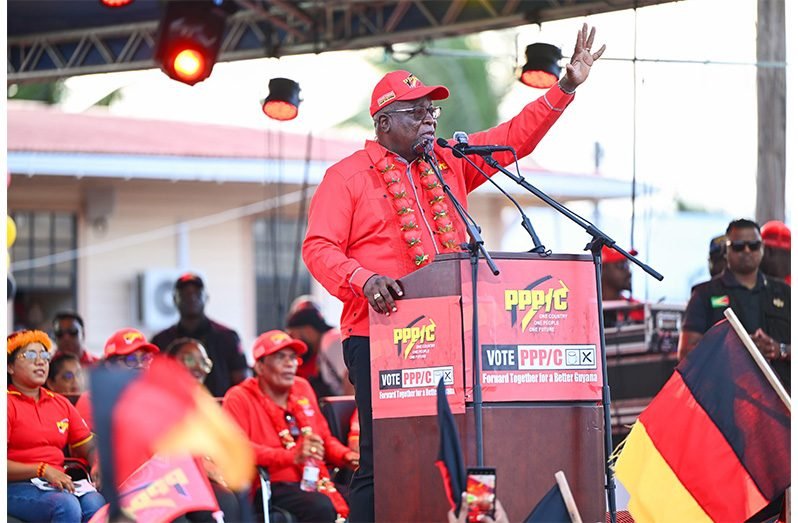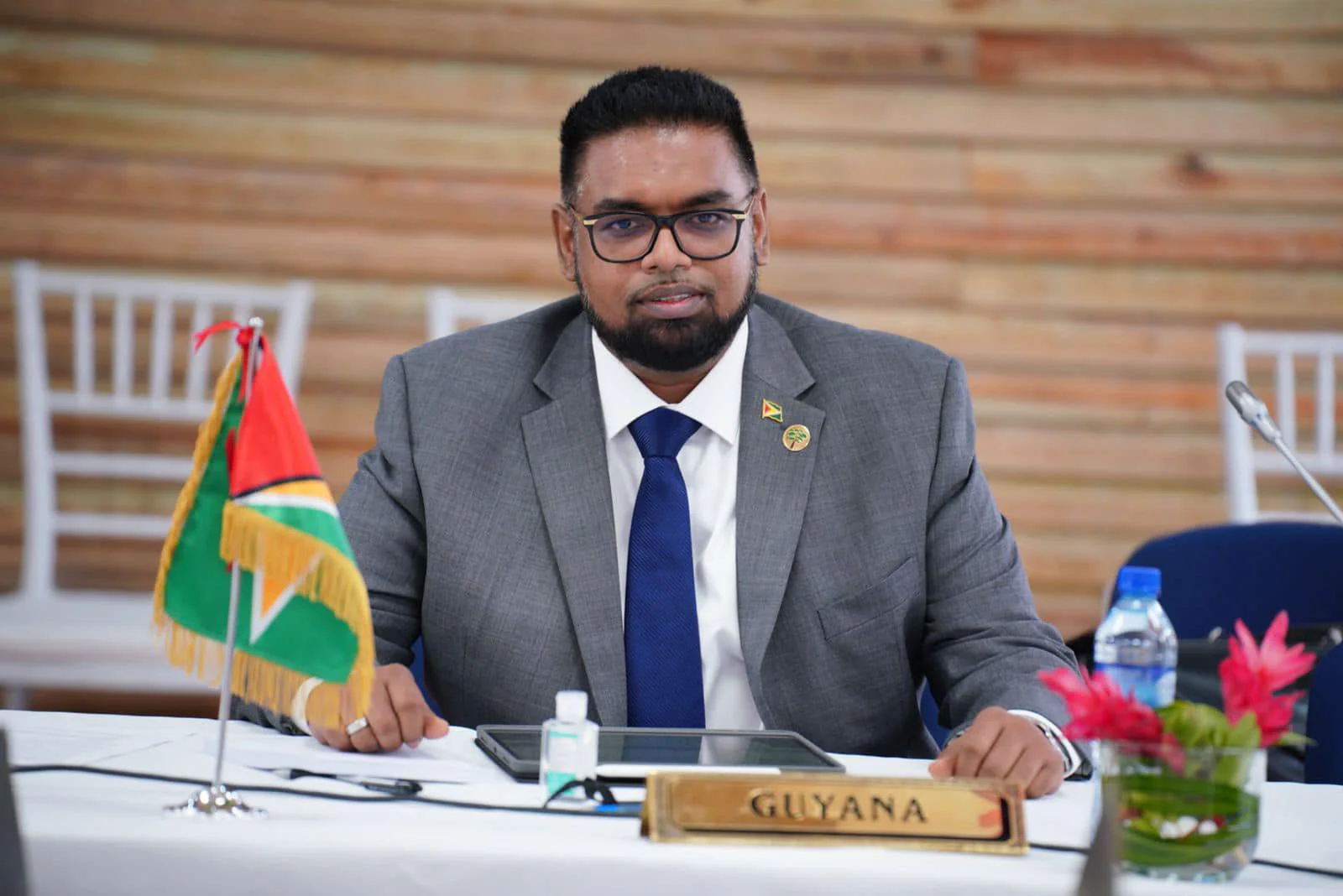Close

By Elections & Governance Desk | GEORGETOWN, 25 July 2025
Trust, delivery and leadership framed the People’s Progressive Party/Civic’s latest public meeting at Turning Point, South Georgetown, where cabinet ministers asked voters to judge the government not by slogans but by visible transformation over the past five years. Minister within the Ministry of Housing and Water Susan Rodrigues opened with a refrain that drew loud cheers—“Everything under the PPP only goes up”—before reeling off evidence that the administration has exceeded its 50,000‑house‑lot target and expanded subsidies for steel, cement and other building materials so that first‑time owners can turn allocations into homes.
Rodrigues reminded the crowd that the scale of the housing programme remains unmatched in Guyanese history, crediting streamlined land‑tenure reforms and low‑interest financing for a construction boom that has rippled through hardware stores, small contractors and micro‑lenders. She insisted that the policy is not confined to PPP/C strongholds, pointing to titles issued in every region “whether they voted for us or not,” a line that drew approving nods from pensioners positioned near the front of the stage.
Turning to the broader economy, Public Works Minister Bishop Juan Edghill said the government’s development push is “purpose‑driven, not accidental,” and cited more than 5,000 community roads surfaced since 2020. He linked those kilometres of asphalt to growing local commerce, shorter school commutes and plummeting vehicle‑repair bills, then reminded listeners that South Georgetown itself will benefit from feeder upgrades connecting to the new Demerara River Bridge and the East Coast‑East Bank bypass.
Edghill acknowledged that governing at speed invites mistakes—“Yes, the PPP makes mistakes, and we never deny it”—but argued that the test of leadership is course‑correction paired with continued delivery. He quoted recent infrastructure audits showing ninety‑eight per cent on‑time completion for health‑centre refurbishments and school‑feeding kitchens, promising a similar record for hospital modernisation in Georgetown and Lethem now moving from design to procurement.
Both ministers contrasted the present moment with what they called the “bankruptcy years” of the APNU+AFC administration, when stalled public spending saw projects cancelled and social benefits curtailed. Rodrigues reminded residents that cash‑grant top‑ups, uniform allowances and the Because We Care programme had all vanished during that period, only to be restored—then doubled—under President Irfaan Ali.
The speakers linked social safety nets to economic diversification, noting that tuition‑free University of Guyana programmes and GOAL scholarships have lifted enrolment in nursing, software engineering and agri‑business. Edghill singled out the gas‑to‑energy project, now in advanced civil‑works stages, as the “powerhouse” that will slash tariffs by half and enable the expansion of cold‑storage, agro‑processing and light‑manufacturing clusters. He argued that cheaper power is the gateway to “jobs people can build families on” rather than just subsistence incomes.
As dusk settled over the junction, chants of “Safe hands! Safe hands!” echoed when Edghill told voters that September 1 is about choosing steady stewardship to carry Guyana from 2020‑2025 momentum into a 2030 horizon of fully modernised ports, hinterland highways and universal secondary education. Rodridgues, for her part, said the party’s confidence in re‑election stems from respect for the electorate: “We delivered because we remembered who put us here.”
Political analyst Dr Roxanne Persaud, interviewed on the sidelines, observed that the PPP/C’s Good Hope and Kitty rallies showcased youth inclusion, while the South Georgetown meeting pivoted to bread‑and‑butter delivery—“a deliberate triangulation that touches aspiration, identity and household economics in quick succession.” Meanwhile CADRES polling released earlier this week shows a ten‑point swing toward the governing party among lower‑income urban voters who cite “visible improvements” in their neighbourhoods as a motivator.
Opposition speakers dismissed the South Georgetown turnout as orchestrated, but social‑media geolocation data from independent firm SocialBench GY found the majority of check‑ins were from within a three‑mile radius, underscoring grassroots rather than bussed‑in attendance. Local shop‑owner Keisha Narine said the new drainage culverts and resurfaced access road have tripled evening foot traffic to her grocery stall: “Development walked right up to my door; that’s why I’m here tonight.”
As the meeting closed, Edghill offered a final metric: average disposable income, adjusted for inflation, has risen twenty‑four percent since 2020, according to Bureau of Statistics quarterly surveys. “That’s not a promise; that’s a pay‑slip,” he said before leading the crowd in the “Forward Together” slogan that has become the auditory watermark of the 2025 campaign.
For undecided voters, the ministers’ message was clear: the path from promise to project to paycheck is already mapped—and paved—under the PPP/C. Whether that narrative holds through election day will depend on whether citizens feel the tremor of new engines in their own streets as convincingly as the speakers say they do.
Sources: Guyana Chronicle, “Gov’t ministers highlight promises fulfilled by PPP/C administration,” 25 July 2025; Guyana Chronicle, “Next five years about creating wealth for your children,” 25 July 2025.
South Georgetown’s late‑afternoon traffic was still thinning on 25 July when word spread that the CARICOM Prime Ministerial Sub‑Committee on Cricket, chaired by President Irfaan Ali, had issued its most uncompromising statement in years. Meeting virtually four days earlier, the sub‑committee concluded that the region’s greatest sporting brand now stands “on the brink of irrelevance” and that only swift structural reform can prevent deeper collapse. The communiqué, released to regional media on Friday, framed cricket as an economic, cultural and emotional asset that transcends boundary ropes and scoreboards.
Ali’s fingerprints were evident in the language: the game was called “a public good that has lifted Caribbean identity for generations,” and its decline a direct threat to tourism jobs, youth engagement and even the region’s soft power. He reminded colleagues that stadium turnstiles and television contracts once funded community programmes from Bridgetown to Berbice; losing that revenue would leave a gaping hole in national budgets already stretched by climate crises.
Behind the rhetoric lay numbers that worry finance ministries. West Indies Test rankings have slipped to eighth, bilateral tours are shrinking, and sponsors have begun to demand performance clauses. The committee cited failures in youth development pathways, opaque selection systems and what it called “boardroom drift,” a euphemism for governance inertia inside Cricket West Indies (CWI). Ali’s intervention was blunt: “Every match we play is watched by children who decide whether cricket is their future or a relic.”
The statement resurrected three reform blueprints that have gathered dust: the Patterson Report of 2007, the Eudine Barriteau review of 2015 and the Wehby report of 2020. Each recommended modern corporate structures, independent directors and transparent player pathways; none was fully implemented. The sub‑committee’s missive declared the piecemeal approach exhausted and warned that CARICOM would consider “all available policy instruments” if CWI failed to act before year‑end. That phrasing, officials confided, includes withholding government subventions and using air‑rights licences as leverage—tools no previous chair had threatened to deploy.
In a bid to break stalemate, Ali announced the formation of a special panel that will gather cricket legends, private‑sector heavyweights and university scholars to consolidate earlier recommendations into an action plan. CWI and national boards are invited but no longer hold veto power over the agenda. The panel will table its draft at a face‑to‑face summit in Georgetown this October, aligning with Guyana’s election season and virtually guaranteeing packed galleries for any public sessions.
Economists in Georgetown see more than sporting pride at stake. A return to competitive form could unlock broadcast rights approaching US $50 million annually and boost visitor arrivals for tournaments, figures that dovetail neatly with PPP/C’s diversification mantra. Tourism operators argue that a rejuvenated West Indies side playing day‑night Tests in the Guyana Amazon Stadium would fill hotels otherwise reliant on oil‑sector conferences. Ali’s government, they note, has already earmarked G$2 billion for a sports‑tourism push tied to cricket academies and heritage trails.
For the PPP/C campaign the timing is exquisite. Ali’s leadership on cricket allows the party to project regional influence while insulating itself from opposition claims that it is distracted by overseas diplomacy. Pollster CADRES reports a seven‑point bump among undecided male voters aged eighteen to thirty after news outlets carried images of Ali chairing the virtual meeting in a maroon tie—a subtle nod to West Indies colours. Communications strategist Christopher Nascimento says the move “blends bread‑and‑butter patriotism with progressive governance branding,” a useful counterweight to APNU speeches that focus narrowly on domestic grievances.
Opposition figures offered muted criticism. Former sports minister Nicolette Henry acknowledged that West Indies cricket needs “urgent triage” but questioned whether CARICOM should dictate terms to a private sporting body. CWI itself issued a guarded response, welcoming dialogue while warning that “political prescriptions rarely solve on‑field problems.” Yet even within CWI, insiders admit that commercial lenders have begun to insert performance triggers in loan covenants, a reality that may leave the board with little room to manoeuvre.
On social media the announcement went viral under the hashtag #BackToDominance, trending in Guyana, Trinidad and Jamaica within hours. Fans posted split‑screen images of Clive Lloyd lifting the 1975 World Cup beside modern squads huddled after yet another batting collapse. The visual contrast sharpened the sense that something precious could slip away if deadlines pass unheeded.
Ali closed the communiqué with a line that resonates beyond sport: “The time for talk is over; the Caribbean must build a cricket future worthy of its past.” For voters assessing leadership credentials, the remark functions as campaign shorthand: here is a president willing to confront stagnation, set targets and hold institutions accountable. Whether reforms materialise or stall in familiar boardroom gridlock remains to be seen, but for now the PPP/C can argue that even the fate of West Indies cricket rests on its capacity to translate study into action—exactly the narrative it hopes to carry to the polls on 1 September.
The morning after President Irfaan Ali unveiled a US $15.2‑billion price tag for Guyana’s standing forests, the Global Biodiversity Summit’s packed auditorium heard an unexpected echo from across the Amazon. Brazil’s COP30 president‑designate, Ambassador André Corrêa do Lago, joined the Georgetown forum via tele‑link and declared that the next United Nations climate conference, scheduled for Belém this December, “will be extremely dynamic” because biodiversity will finally be given equal weight alongside carbon. His endorsement did more than flatter the host nation; it elevated Guyana from willing participant to co‑author of the COP30 script.
Do Lago’s remarks framed biodiversity as economic infrastructure—a direct riff on Ali’s thesis that rain‑forests should be financed as rigorously as highways or fibre‑optic cables. He listed carbon markets, forest‑restoration credits and verifiable biodiversity bonds as the instruments that could close the global funding gap, adding that countries with large forest estates have “an obligation to prove” such credits can meet strict quality tests. The language mirrored Guyana’s own Low‑Carbon Development Strategy 2030, which pledges to monetise not only carbon storage but also the broader ecological services that flow from intact ecosystems.
The timing of the exchange was political gold for the People’s Progressive Party/Civic. With six weeks to general elections, PPP/C strategists are eager to present Ali as the Caribbean statesman who made biodiversity bankable while keeping domestic growth at forty‑plus percent. Pollster CADRES notes that sixty‑one percent of undecided voters now rate climate action “important” or “very important,” up fourteen points from 2022. A regional summit in the capital, backed by a Brazilian diplomat’s public nod, transforms an abstract foreign‑policy win into an election‑season asset: Guyana is no longer merely attending COP30; it is helping to design it.
Behind the stagecraft, substance is piling up. Ali has already secured a memorandum with the Yale Center for Biodiversity & Global Change to build a national biodiversity information system and a bricks‑and‑mortar research hub near Timehri. The summit also birthed the Global Biodiversity Alliance, a network of governments, companies and academic labs that promises to funnel science and capital into habitat conservation projects. The alliance’s first white paper, slated for release in August, will be tabled at COP30 as proof that middle‑income forest nations can lead rather than plead. For PPP/C campaign surrogates, every forthcoming document is a talking point; for technocrats, each draft is a step toward turning ecological assets into balance‑sheet line items.
Scepticism remains, and the administration seems ready for it. Opposition MP David Patterson warned minutes after the livestream that “valuation theatre” could inflate expectations and fuel speculative bubbles in immature biodiversity‑credit markets. Transparency International Guyana echoed that caution, urging Parliamentary oversight for any future blue‑bond issuance. Finance Minister Ashni Singh parried by promising IMF‑style debt‑sustainability analyses and Auditor‑General audits on every instrument, a pledge that suggests the government has learned from earlier critiques of opacity in natural‑resource deals. In other words, PPP/C knows that international applause will dissolve quickly if financial footnotes don’t balance.
Do Lago’s speech also carried an implicit challenge: forest countries must produce credits that external verifiers trust. Guyana believes it can answer that call with the same jurisdiction‑wide monitoring that underpins its US $750‑million Hess carbon‑credit sale. Environmental economist Reena Singh argues that the same satellite and field‑sensor architecture can be layered with bio‑acoustic recorders and eDNA sampling to track species diversity—a data stack potentially unmatched in the tropics. If the system works, biodiversity credits could reach two to three hundred million US dollars a year by 2028, a figure that won’t eclipse oil royalties but could fund national parks, village grants and coastal defences without touching the Treasury.
COP30’s Amazonian venue amplifies the optics. Belém sits at the mouth of a river system linked culturally and ecologically to Guyana’s own interior. By co‑crafting the biodiversity narrative before delegates even land, Ali positions himself to walk into Brazil with deliverables in hand: a functioning alliance, a draft credit methodology and pilot sites already collecting baseline data. That level of preparedness could influence agenda‑setting in corridors where small states normally jostle for microphone time. For Guyanese voters, it feeds a simpler storyline: their president sits at tables where decisions about forests—and, by extension, floods, crops and jobs—are being made.
Private‑sector actors are already running their own numbers. A leading rice exporter estimates that premium branding tied to “biodiversity‑positive” supply chains could lift farm‑gate prices ten percent within three seasons. A boutique tourism operator tells this newspaper that high‑spend visitors increasingly demand proof that their jungle lodges support conservation. Even oil‑sector service firms, wary of reputational risk, have begun exploring biodiversity offsets. Such talk would have sounded fanciful five years ago; today it is part of investor calls and Chamber‑of‑Commerce luncheons. Whether these projections materialise may hinge on COP30 decisions, but the expectation itself signals that the PPP/C narrative is permeating boardrooms as well as rallies.
Do Lago closed his address with a warning: the global south must organise its data and speak with one voice or risk being “strongly manipulated” in carbon markets designed elsewhere. Ali seized on that phrase in his own wrap‑up, reminding delegates that Guyana’s summit report will circulate to every capital before negotiators arrive in Belém. The subtext was clear: the country intends to shape definitions, not just comply with them. For a nation once overshadowed in climate forums, that shift from recipient to rule‑writer is profound—and politically potent.
By evening the #COP30Caribbean hashtag trended across regional Twitter feeds, buoyed by cell‑phone clips of Ali’s closing handshake with do Lago. Opposition commentators tried to recast the moment as “chasing headlines abroad,” but their critiques struggled for traction against images of two presidents aligning on forest finance. For the governing party, it was another notch in a week of narrative victories: forestry valuations, Yale partnerships, ministerial promise‑checklists and now a front‑row seat at the planet’s biggest climate negotiation. Whether these wins translate into ballots on 1 September will depend on how voters weigh pocketbook gains against global prestige, yet the PPP/C’s campaign can credibly claim that Guyana’s voice on the world stage has never been louder—or more lucrative.

The Guyana Project is an independent media platform delivering fact-checked, ground-level reporting on politics, economy, and public life in Guyana. With a focus on transparency and development, we bring unfiltered news and thoughtful analysis to help shape a more informed, forward-looking nation.

Promises Delivered, Momentum Secured: Ministers Take South Georgetown Stage to Defend PPP/C Record

Lorem Ipsum is simply dummy text of the printing and typesetting industry. Lorem Ipsum has been the industry’s standard dummy text ever since the 1500s, when an unknown printer took a galley of type and scrambled it to make a type specimen book. It has survived not only five centuries, but also the leap into electronic typesetting, remaining essentially unchanged. It was popularised in the 1960s with the release of Letraset sheets containing Lorem Ipsum passages, and more recently with desktop publishing software like Aldus PageMaker including versions of Lorem Ipsum.
t is a long established fact that a reader will be distracted by the readable content of a page when looking at its layout. The point of using Lorem Ipsum is that it has a more-or-less normal distribution of letters, as opposed to using ‘Content here, content here’, making it look like readable English. Many desktop publishing packages and web page editors now use Lorem Ipsum as their default model text, and a search for ‘lorem ipsum’ will uncover many web sites still in their infancy. Various versions have evolved over the years, sometimes by accident, sometimes on purpose (injected humour and the like).
Contrary to popular belief, Lorem Ipsum is not simply random text. It has roots in a piece of classical Latin literature from 45 BC, making it over 2000 years old. Richard McClintock, a Latin professor at Hampden-Sydney College in Virginia, looked up one of the more obscure Latin words, consectetur, from a Lorem Ipsum passage, and going through the cites of the word in classical literature, discovered the undoubtable source. Lorem Ipsum comes from sections 1.10.32 and 1.10.33 of “de Finibus Bonorum et Malorum” (The Extremes of Good and Evil) by Cicero, written in 45 BC. This book is a treatise on the theory of ethics, very popular during the Renaissance. The first line of Lorem Ipsum, “Lorem ipsum dolor sit amet..”, comes from a line in section 1.10.32.